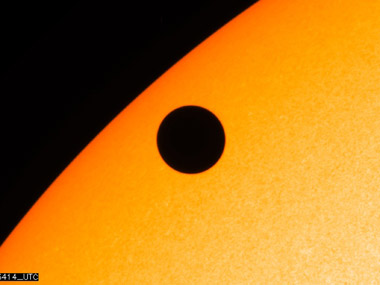All around the world, people are craning their necks right now - and watching what is perhaps one of the rarest celestial event of our lifetime: the Transit of Venus across the sun. Amateurs and professional astronomers are getting an eyeful of a small black dot making its way across the surface of the sun It may seem unspectacular to most; in many cases, it’s the rarity of the event that lends it its significance. The last time it happened was in June 2004, but the next one won’t come along until December 2117. [caption id=“attachment_333461” align=“alignright” width=“380” caption=“Venus in transit. Nasa image from Reuters”]  [/caption] For scientists, however, this event is considered one of the most important events in scientific history. In the widest sense of the term, it helps provide an “interplanetery perspective” - and better understand our place in the universe. Each such event helps scientists get more accurate measures of the size of the solar system. As Gizmodo reports, “by noting the time each planet took to go around the sun, and then crunching that data via methods developed by 17th century mathematician Johannes Kepler, these telescope-equipped boffins could determine each planet’s relative distance from the sun, as measured in terms of astronomical units (the distance from the Earth to the Sun). Collecting such data during a transit was the reason Captain Cook was able to travel halfway around the world from London to Tahiti in 1769. Anyone keen on watching the spectacle ought to take a few elementary precautions. Since you’re staring into the sun, you need an “eclipse shade” or welding glasses. (Sunglasses are not adequate protection!) Alternately, you can use a pinhole projector, the sort of thing we used to play with in our school days. ( More safety precautions here.) Of course, in this age of advanced technology, you don’t have to stir out of bed to watch the transit. There’s an app for it - on both Android and iPhone platforms ( here). Stunning crowdsourced images of the event, from all across the world here. The Guardian has live video coverage.
People across the world are waking up to one of the rarest planetary phenomena: the transit of Venus.
Advertisement
End of Article


)
)
)
)
)
)
)
)
)



